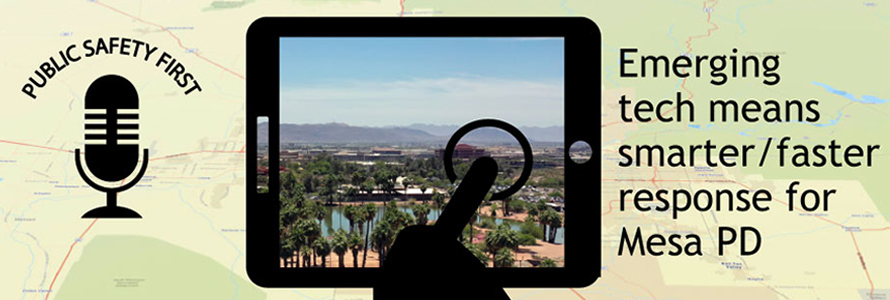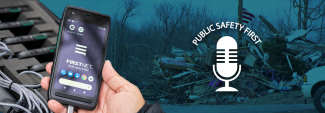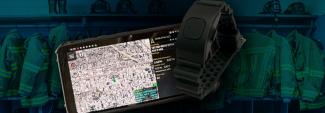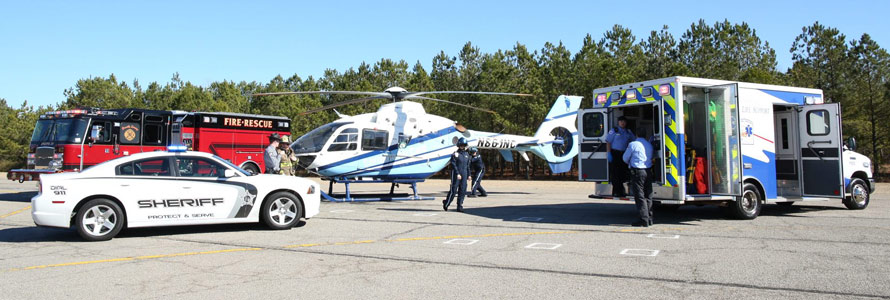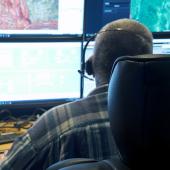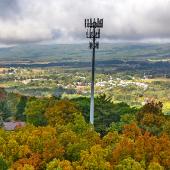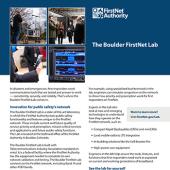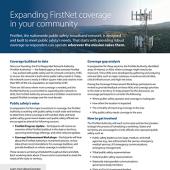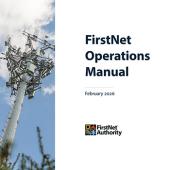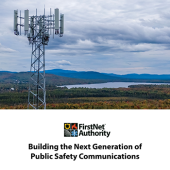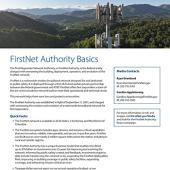Summary
After rolling out FirstNet, the Mesa Police Department in Arizona developed new technology, including a mobile app, to enhance response times for law enforcement officers.
Guest
Dave Faulkner
FirstNet Senior Public Safety Advisor, Region IX (AZ, NV)
Sergeant Frailan Young, Jr.
Mesa (AZ) Police Department
Transcript
Preview
Dave Buchanan: Hi, this is Dave Buchanan and welcome to the Public Safety First podcast. The podcast you’re about to hear is part of our Roadmap podcast series, which provides more information about the FirstNet Authority Roadmap – our guide to the future of FirstNet.
As part of this series, we’re showcasing the six domains that provide the foundation for the Roadmap. Today’s episode dives into the User Experience domain, which focuses on how we can equip first responders with simple, easy-to-use devices and apps so they can easily communicate and access the information they need. In today’s episode, FirstNet Authority Senior Public Safety Advisor David Faulkner speaks with Sergeant Frailan Young, Jr. of the Mesa, Arizona Police Department about how his agency is using FirstNet and developing a new app to help with records management and data collection in the field. Thanks for listening!
Dave Buchanan: Hi, this is Dave Buchanan and welcome to the Public Safety First podcast. The podcast you’re about to hear is part of our Roadmap podcast series, which provides more information about the FirstNet Authority Roadmap – our guide to the future of FirstNet.
As part of this series, we’re showcasing the six domains that provide the foundation for the Roadmap. Today’s episode dives into the User Experience domain, which focuses on how we can equip first responders with simple, easy-to-use devices and apps so they can easily communicate and access the information they need. In today’s episode, FirstNet Authority Senior Public Safety Advisor David Faulkner speaks with Sergeant Frailan Young, Jr. of the Mesa, Arizona Police Department about how his agency is using FirstNet and developing a new app to help with records management and data collection in the field. Thanks for listening!
Narrator: You're listening to Public Safety First, a podcast to help you learn about the First Responder Network Authority and how you can be part of the future of public safety technology.
And now your host.
Dave Faulkner: This is Dave Faulkner, a Senior Public Safety Advisor from FirstNet. This is the Public Safety First podcast.
Good evening, Frailan. I really appreciate you joining us. I had a couple of questions for you. Would you mind telling a little bit about yourself first, your department, and some of the unique challenges that you face over at Mesa PD [Police Department]?
Sgt. Frailan Young: Yeah, sure, no problem. My name is Frailan Young, Jr. I’m a sergeant with the Mesa Police Department. I’m a 21-year veteran of the department. Currently I’m assigned to our Technical Services Division, and I’m responsible for field technology and innovation.
Basically, anything that goes in our patrol cars for our field personnel, patrol personnel, operations personnel usually comes to me first for evaluation and to make sure that it’s the right product for our officers and our detectives.
Dave Faulkner: First time I met you, Frailan, I came over to watch you guys roll out some of the first FirstNet phones. I wanted to sit down with a field squad, see how it went, and essentially, that’s kind of my question. As your department is in the process of transitioning to FirstNet, could you talk a little bit about that and why did Mesa PD choose to join the network, and how’s this roll out going for you?
Sgt. Frailan Young: Back in February, we started a roll out of 425 FirstNet phones – in particular, iPhone XRs. So we started back in October with the deployment, and we were looking at FirstNet phones and the service, and we had the President come out to our airport out east – it’s called Phoenix-Mesa Gateway Airport – and he had a rally out there and we did a live deployment of these phones, and the service that we observed with the phones, they were able to, with the thousands of people that were at that location, they were able to operate. Whereas, some of the technologies that we had were overwhelmed at the time.
The deployment has gone well with the phones. A lot of the officers actually looked forward to it because they weren’t able to call our citizens back in a timely manner, and the citizens didn’t have a way to directly connect to the officers. So with these phones, citizens can call the officers directly, leave a voicemail for them, and get that one-on-one interaction and timely response to their questions and their calls.
Dave Faulkner: Was there any other success stories or lessons learned that you’ve done?
Sgt. Frailan Young: Yes, currently we are deploying a new RMS system [records management system] in Mesa, and part of that RMS system has, it has a mobile application that we’re going to use on our FirstNet phones for patrol. That application will allow the officers to use their phone to capture and scan driver’s licenses, registrations, run inquiries from the phone in the field. They’ll also be able to collect photos. They’ll also be able to use that for dictation of their reports. They can do voice-to-text inside of that application.
For any kind of minor case, say if we had an accident – a traffic accident – the officers could be writing the same information five to six times, over and over. With the use of this app on the phone and the phones in the field, they’ll be able to capture it and all that information will be electronically transferred into our RMS system.
Our digital management system, currently we use point-and-shoot cameras, our officers do, for minor crimes, which requires them to take pictures, at the end of the night, pull an SD card out of the camera, carry it inside the station, download it on to the computer and then upload it into the server. With this app that we are developing, and almost have live – it’s really close to being live right now – they’ll be able to take the photos in the field using the app for that evidence management system and upload it right from the field. So it will take out the time needed for them to take the SD card out and plug it into the computer, and that whole process will be gone.
Dave Faulkner: What led your agency to use you, or to pursue these new technologies? It’s great that they have a guy like you that’s an officer and has an understanding of technology.
Sgt. Frailan Young: Well, I appreciate that Dave. During my career, I’ve had, I’ve run the gamut of different types of assignments. From patrol officer, narcotics detective, gang detective, investigative detective, supervisor. During all of these times, I used to talk to my squad mates, my squad mates would talk to me or my supervisors, and there had to be a better way of the way we were doing things. Because a lot of stuff we were doing was inefficient. It appeared inefficient, at least. The duplication of entry of information, several times, and the possibility of that information, by mistake, typing it in incorrectly into the computer system. Something like that, that’s huge in our realm with legal proceedings and whatnot, it’s huge. So I had always looked at that, and usually when iPhones came out, iPads came out, because especially when we were in the cars in plain-clothes assignments, or non-patrol assignments, having the access to that type of information on-the-go was awesome. Whereas before, it was a binder that we carried around with printed out papers. I’m sure you remember that.
Dave Faulkner: A lot of lost time.
Sgt. Frailan Young: Yes, a lot of lost time. So I’ve always looked at that process, and I’m one of those guys that asks ‘why?’ all of the time. ‘Why are we doing it this way? Well, we’ve always done it this way.’ That’s, right now, the way I feel about things now and how I’ve always felt was sometimes that’s not good enough. We can improve ourselves. If there is a possibility to improve things, we should be looking at that.
The phones that we have now, they’re always live, they’re always connected to our servers, categories are always correct, and always updated to the most current version, and it just allows them not to, it minimizes the possibility for them to miscategorize those files with the metadata.
Dave Faulkner: Is there any challenges, like with cybersecurity, or getting the officers trained? Have you seen any issues with that?
Sgt. Frailan Young: We’ll start with getting the buy-in from the leadership. Mesa PD has always been forward thinking, especially in technology to try and leverage that type of technology to help us do our jobs more efficiently. Our current leadership and our past leadership, that has been, that has been our mission. Anything that we can do to help our officers do their job more efficiently, effectively, and most importantly, safely, they look to implement.
Dave Faulkner: Were there things that you saw in getting this out to the officers in the field that, things you could share that would help others who are going to be doing the same thing?
Sgt. Frailan Young: Dedicate the proper amount of resources needed to effectively train the officers on what they need to do. We established, prior to going out, we have both our sworn personnel and we have IT personnel. They’re able to make sure that everything on the back end works the way it’s supposed to be for the officers. Making sure that they’re, that the firewalls are set up, making sure that all of their permissions and whatnot that they need to use the programs and the applications on the phone are set up correctly.
Dave Faulkner: Are there any policies or processes that you guys had to change because of this?
Sgt. Frailan Young: Yes, our policies regarding our mobile device usage was changed significantly. The policy dealt mainly with cell phones. It didn’t meet the standards – the national standards, or the suggested standards nationally – by IACP [International Association of Chiefs of Police], Major Cities Chiefs, regarding mobile device usage, so we modeled our policy with those recommendations in mind. The phones, the direction we give for policy, is that they are for business-related purposes only, and we recommend that they use them when they’re at work, not on their off hours.
Dave Faulkner: There is so much gear on an officer’s belt – where are the guys and gals carrying the phones on?
Sgt. Frailan Young: It depends on the type of uniform that they wear. We have our Class B’s uniform that are, you know, our polyester uniforms, and we also allow our officers to wear a softer uniform that has an external vest carrier.
Given that we gave devices to officers, patrol officers in particular, previously for the Axon device, a lot of them had pockets that they were putting that device in, which is a little smaller than the XR, and a lot of them are utilizing that same pocket on their external vests. The people in their Class B’s or in their polyester uniforms, we give them a clip and they usually put it on their belt.
Dave Faulkner: That’s a, I mean, we both know that’s a big issue for folks out on the street, you know –
Sgt. Frailan Young: Yeah, absolutely.
Dave Faulkner: – we come up with all of these great ideas and new technology, but their gear belt is already full.
Sgt. Frailan Young: Yep.
Dave Faulkner: And, so –
Sgt. Frailan Young: And we brought them on board, we have a, there’s a small group of patrol officers in the field that we count on regularly to test things, and we’ll give that to them and say, ‘Hey, what do you think?’ –
Dave Faulkner: That’s a good idea.
Sgt. Frailan Young: – And not only for the phones, for pretty much every program that’s going to impact their operations, we’ll pull a small group – ‘This is what we’re thinking about doing, what do you guys think about it?’ And if it’s good, great, if it’s not, we have work to do obviously.
Dave Faulkner: With what you’ve seen, is there other things you’d like to see, or other capabilities that would be helpful to you guys?
Sgt. Frailan Young: We’re trying to leverage at Mesa some of the vendors and programs that we have right now. We’re going back to our vendors and saying, ‘Hey, what do you have as far as an application? Do you have an application for this?’ And, surprisingly, some do, so we can put those applications on the phones, whereas before, we had to go to a desktop and login, or go back to your car and login, where, the application, we can put it on their phone and they’ll have the same capability that they have on their desktop, they don’t have to go back to the station.
Dave Faulkner: Thanks Frailan –
Sgt. Frailan Young: Sure.
Dave Faulkner: – really appreciate you spending the time today.
Sgt. Frailan Young: No problem, thank you.
Narrator: Thanks for listening today. We're excited to have you join our podcast community. Make sure to subscribe on iTunes, SoundCloud, and YouTube. You can learn more about the First Responder Network Authority at FirstNet.gov and learn about FirstNet products and services at FirstNet.com.


